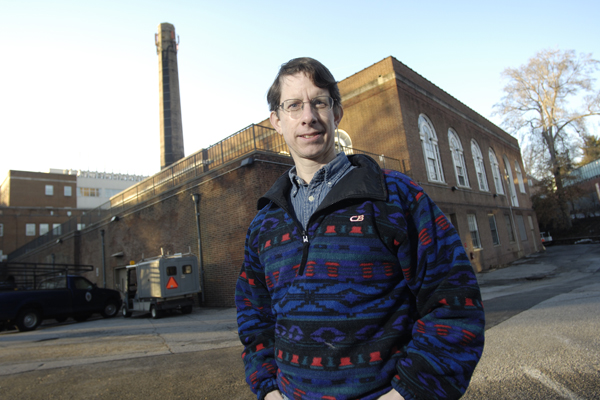February 14, 2011
E2SHI: New acronym, big ambitions
Environment, green energy among topics of focus for new institute

Ben Hobbs, seen in this file photo in front of the Homewood power plant, has been named inaugural director of the Environment, Energy, Sustainability and Health Institute. Photo: Will Kirk/Homewoodphoto.jhu.edu
Drawing on faculty expertise in environmental science and engineering, public health and other areas, The Johns Hopkins University has launched its Environment, Energy, Sustainability and Health Institute to promote research and education in topics ranging from green energy practices to climate change and related health issues.
“This kind of research right now is distributed all across the university,” said Benjamin Hobbs, director of the institute. “Because of this, it’s been a challenge to put together interdisciplinary teams to study these topics, and our profile on these issues is not as high as it should be. The institute’s goal is to encourage these research and education partnerships and to promote Johns Hopkins as a world leader in these areas.”
The creation of this institute, called E2SHI for short (and pronounced eh-shee), was a key recommendation in the university’s Implementation Plan for Advancing Sustainability and Climate Stewardship. This 2010 plan was drafted to address some of the goals set by a task force assembled by then university President William R. Brody. The task force completed its recommendations and presented them to Brody’s successor, President Ronald J. Daniels, who enthusiastically endorsed them.
The institute began taking shape last year, when the Provost’s Office contributed startup funds. Then, this past autumn, the deans of the Whiting School of Engineering, Krieger School of Arts and Sciences and Bloomberg School of Public Health approved E2SHI’s charter and agreed to provide financial support.
Hobbs, the Theodore M. and Kay W. Schad Professor in Environmental Management in the Whiting School, was selected as the institute’s first director. Cindy Parker, an assistant professor with dual appointments in the Bloomberg School’s Department of Environmental Health Sciences and the Krieger School’s Department of Earth and Planetary Sciences, was named associate director.
In recent weeks, activity at the institute has accelerated.
• The institute has launched an internal seed grant program, offering up to $25,000 for 12 months of work. These funds will be awarded to launch institute-related research projects that involve cross-divisional collaborations and that are likely to receive longer-term funding from outside sources. Seed grant applications are being accepted through Feb. 28.
• On its new website (e2shi.jhu.edu), the institute is spreading the word about grant opportunities related to air quality, energy and environmental sustainability, with funding available through the National Science Foundation, the Environmental Protection Agency and other external sources.
• The institute has set up a fellowship program to support graduate students who will engage in multidisciplinary research on the environment, energy supply and use, economic and ecological sustainability, or projects that have a public health link to these topics. Fellowship applications are due Feb. 21.
• Plans are under way for a kickoff event that will feature a welcome statement from President Daniels and a symposium on institute-related topics. The event is slated for the afternoon of April 20, during Earth Week, at a location that will be determined soon.
Hobbs said that he is “immensely pleased by the interest shown in our startup and fellowship programs as the institute gets rolling. People across the university are talking about how they might work together on research in science, engineering and policy that will be critical to helping Johns Hopkins, Maryland and, indeed, the world on the path to sustainability.”
Although the institute’s startup funding is coming from the Whiting, Krieger and Bloomberg schools and the central administration, the goal is to become financially self-sufficient by obtaining grants, contracts and donations. Another goal is to establish ties to other Johns Hopkins divisions, including the Applied Physics Laboratory, School of Medicine, School of Advanced International Studies and Carey Business School. APL, SAIS and the Carey School already have representatives on E2SHI’s executive committee.
Initially, the Whiting School is hosting the Environment, Energy, Sustainability and Health Institute.
“This is an area in which I believe Johns Hopkins can have a major impact,” said Nick Jones, the Benjamin T. Rome Dean of the school. “The institute provides the structure necessary to create highly complementary cross-divisional collaborations, leverage existing expertise and attract new funding and research partners as we systematically address issues of global importance.”
Institute director Hobbs said that the organization follows the general model established by the university’s Homewood-based Institute for NanoBioTechnology. The INBT, launched in 2006, is largely a “virtual” organization that has limited facilities of its own but promotes interdisciplinary projects involving more than 200 affiliated researchers in five Johns Hopkins divisions. Since its creation, INBT has attracted more than $25 million in interdisciplinary research funding.
In addition to fostering Johns Hopkins research in its own specialized topics, the Environment, Energy, Sustainability and Health Institute will seek to enhance and coordinate environmental curricula at the undergraduate and graduate levels.
Yet another aim is to develop partnerships with the business sector, government agencies, environmental groups and Baltimore community organizations. The institute also will work with the university’s Office of Sustainability in connection with ongoing carbon reduction efforts.
“Other universities have established environmental institutes,” Hobbs said. “However, we have unique capabilities—especially in the health, space technology, green energy and policy areas—that will enable Johns Hopkins to contribute in ways no one else can. We are enthused about the quality of people and research already happening here, and we believe that working together will enable utterly remarkable things to happen.”
For more information on grant applications and the upcoming kickoff event, go to e2shi.jhu.edu.

